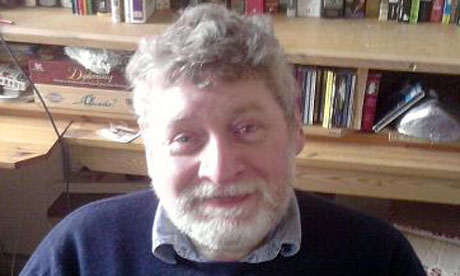
The publisher Nick Webb, who has died of a pulmonary embolism following a stroke aged 63, commissioned Douglas Adams to turn his cult radio series The Hitchhiker's Guide to the Galaxy into a novel. Published in 1979, the book sold 250,000 copies within three months and 1m copies by 1984. Webb had been tipped off by his brother-in-law, who had heard the first episode of the radio series, that "something amazing was squeaking out of his radio on a Wednesday night – so I listened. I was sure that somebody that inventive could write a book."
He and Adams met in a pub close to Oxford Circus. "We talked about philo- sophy and science fiction. Douglas had a very philosophical cast of mind – all those jokes about phenomenology and whatnot – so I was surprised that he was a natural, as it were, who had never studied the subject. We got on very well and consumed rather too much beer. I was impressed by his humour and intelligence. You learn in publishing that some authors who are dazzling on the page can be taciturn miserabilists in person. Douglas was exuberant and funny."
It was the beginning of a long association that culminated in Webb writing Adams's official biography, Wish You Were Here (2003). By then Webb had quit publishing, having never felt at ease with the profession. He had not been, he wrote on his website, "the kind of publisher in a crumpled corduroy suit and a book-lined office" but "a commercial publisher with a brow below the socks, who believed in trustworthy information or a good story rather than smart reviews". Many of the firms he worked for reflected this: Arrow, Sphere and New English Library among them.
A large, cuddly bear of a man who grew a beard at the age of 18 to disguise his lack of chin, he said he had started life with a stammer, which explained, he thought, why he had always relished words. He spent his childhood in Kew, south-west London, and was educated at the Tiffin school, Kingston upon Thames. His father was an Irish-born journalist for the Sporting Life; his mother was of Jewish stock, and had arrived in Britain from Germany as part of the Kindertransport scheme. Webb read English and philosophy at Warwick University. His aunt was Kaye Webb, the publisher of Puffin Books, who was for a time married to Ronald Searle.
He had a vivid sense of humour, often word-based, and delighted in mixed metaphors, once relating hearing someone say: "I smelled a rat and nipped it in the bud." Many years later the memory would still make him chortle. In conversation he used words and phrases that were inimitably his own. The acquisition of the first Hitchhiker novel was hardly considered a big deal, he recalled, or as he put it: "I was not proposing that we spend serious sponduliks."
By the time he was commissioning Adams, Webb was senior fiction editor at Pan Books, then London's hottest paperback publisher. He had begun his publishing career at Penguin, in the copy-editing department. His success with The Hitchhiker's Guide to the Galaxy made him much sought after. He had a particular interest in science fiction, which was a booming genre, and also in cosmology. Soon after that success, he was hired by the American-owned New English Library. Although much smaller than Pan, its author assets were formidable, headed by three Americans: Stephen King, Harold Robbins and the creator of the multi-award-winning science-fiction novel Dune, Frank Herbert, as well as a rising British horror writer, James Herbert, championed by Webb.
When New English Library was sold to the British publishing group Hodder & Stoughton in 1981, Webb found himself no longer a big fish in a small pond. He moved on, working for Robert Maxwell, who owned a number of publishing imprints including Sphere, where Webb was managing director. He was headhunted for the biggest job of his career, as chief of the recently established British subsidiary of the huge American publishing conglomerate, Simon & Schuster.
Webb's brief was to build Simon & Schuster into a major force in British publishing and return substantial profits to its US owners. It was a tough assignment, particularly as he found himself often at odds with his American superiors. He also complained that British agents were unconvinced that Simon & Schuster's UK arm had developed sufficient sales and marketing muscle.
After Simon & Schuster dispensed with his services in 1999, he did some occasional publishing consultancy, but confessed that he was not very good at it. He read books with serial potential for a newspaper, but found writing more to his liking. His local magazine in north London bought the occasional literary spoof. As well as Wish You Were Here, he produced two further books, The Dictionary of Bullshit (2007) and The Dictionary of Political Bullshit (2010), which Simon Hoggart described as "crackling with wit and insight".
Webb married the writer Susan Moore in 1979. Their daughter, Catherine, is a successful fantasy writer under the name Kate Griffin. He is also survived by his mother, Eve.
• Nicholas Webb, publisher, born 10 January 1949; died 10 April 2012

